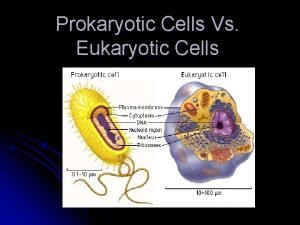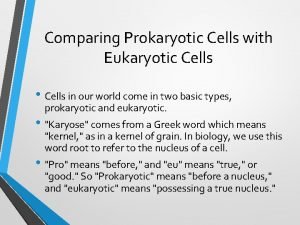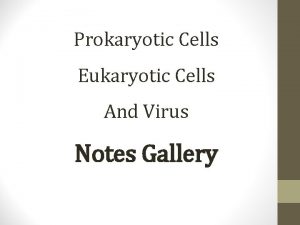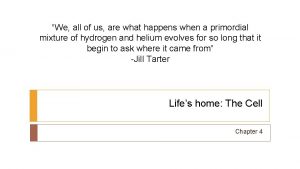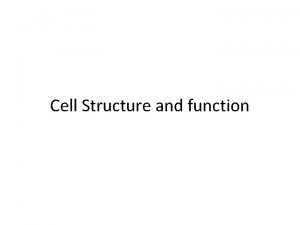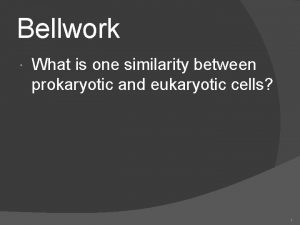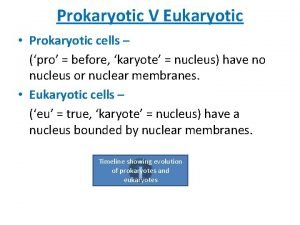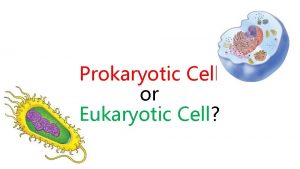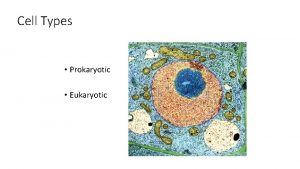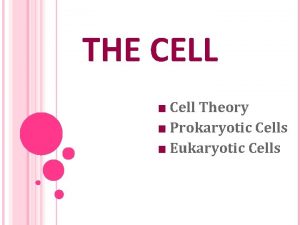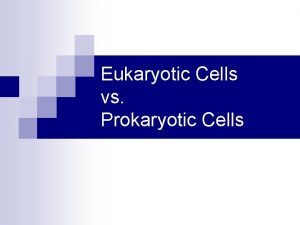Eukaryotic Cells vs Prokaryotic Cells Cell Theory n












- Slides: 12

Eukaryotic Cells vs. Prokaryotic Cells

Cell Theory n The cell theory states that: ¨ All living things are made of one or more cells. ¨ Cells are the basic unit of structure and function in living things. ¨ All cells come from other cells.

Cell Types n Two categories: 1. Eukaryotic Cells -Cells that have membranebound organelles 2. Prokaryotic Cells -Cells that do NOT have membrane-bound organelles -Single celled organisms such as bacteria

Cell Types n Eukaryotic cells¨ Cells that contain organelles which are held together by membranes ¨ Examples include plant and animal cells.

Overview of Organelles n Nucleus¨ Largest organelle in the cell and it is the most inner compartment of the cell ¨ contains chromatin (DNA); genetic information on strands called chromosomes ¨ “control center” for cell metabolism and reproduction

Overview Cont’d n n Ribosomes- make proteins; thought of as “factories” Cytoplasm- clear gel like fluid inside the cell, which suspends all organelles

n Mitochondria- often referred to as the “powerhouse” of the cell release energy for the cell ¨ It converts the energy stored in glucose into ATP for the cell ¨

Eukaryotic plant cell n Plant cells are also Eukaryotic cells, but plant cells contain some organelles that are not found in animal cells.

Plant Cell Organelles n Cell wall- rigid wall outside the plasma membrane. It provides the cell with extra support. n Chloroplasts- captures light and energy; and converts it into chemical energy.


Eukaryotic Cell Structure n The plasma membrane/cell membrane ¨ the flexible boundary of a cell ¨ separates a cell from its surroundings

Plasma Membrane/Cell Membrane continued: n allows water, nutrients, and waste into and out of the cell ¨ This is referred to as selective permeability. *(Selective=Chooses, Permeability=filter through)* n keeping a healthy balance of nutrients and water within the cell is called homeostasis
 Eukaryotic life
Eukaryotic life Prokaryotic cells vs eukaryotic cells
Prokaryotic cells vs eukaryotic cells Are plant cells prokaryotic or eukaryotic
Are plant cells prokaryotic or eukaryotic Is a red blood cell prokaryotic or eukaryotic
Is a red blood cell prokaryotic or eukaryotic Prokaryotic vs eukaryotic cell
Prokaryotic vs eukaryotic cell Prokaryotic reproduction
Prokaryotic reproduction Life
Life Similarities between prokaryotic and eukaryotic cells
Similarities between prokaryotic and eukaryotic cells Diff between prokaryotes and eukaryotes
Diff between prokaryotes and eukaryotes Similarity between prokaryotic and eukaryotic cells
Similarity between prokaryotic and eukaryotic cells Answers
Answers Prokaryotes vs eukaryotes chart
Prokaryotes vs eukaryotes chart Diff between prokaryotic and eukaryotic cells
Diff between prokaryotic and eukaryotic cells

